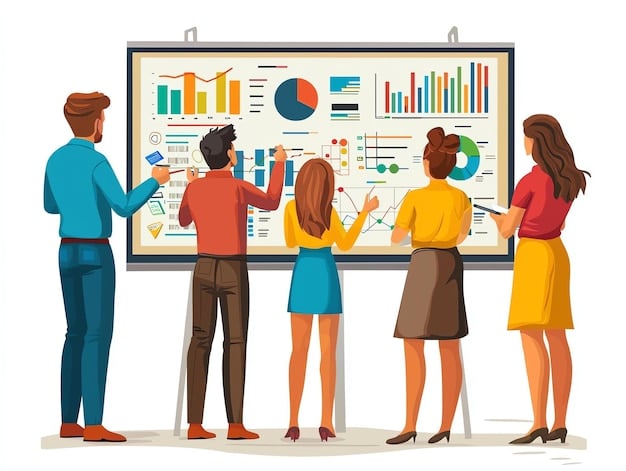Boost Your Career in 2025: Federal Skills Initiative Updates Explained

The updated Federal Skills Initiative for 2025 offers unprecedented opportunities for career advancement, providing funding and resources for skill development crucial for navigating evolving job markets and securing high-demand positions across various sectors in the United States.
In an ever-evolving job market, staying competitive means continuously developing new skills and adapting to emerging industry demands. The federal government recognizes this critical need, and for 2025, it has updated its Federal Skills Initiative, designed to empower American workers with the tools and training necessary to thrive. Understanding How to Leverage the Updated Federal Skills Initiative to Boost Your Career in 2025 is not just an advantage; it could be the strategic move that redefines your professional trajectory.
Understanding the 2025 Federal Skills Initiative Landscape
The 2025 Federal Skills Initiative represents a significant governmental commitment to workforce development and economic resilience. This updated framework builds upon previous programs, expanding reach and focusing on skills that are acutely needed in sectors experiencing rapid technological advancement and growth. It’s an ambitious effort to bridge the skills gap, fostering a more agile and competitive American workforce for the future.
Key Pillars of the Initiative
At its core, the initiative is structured around several crucial pillars aimed at providing comprehensive support for skill acquisition. These pillars are designed to be accessible to a wide range of individuals, from those seeking to upskill within their current roles to those looking to pivot into entirely new industries. The emphasis is on practical, demand-driven training.
- Enhanced Funding for Training Programs: Expect increased federal allocations towards programs that offer certifications, apprenticeships, and vocational training across various high-demand sectors.
- Focus on Digital and Green Skills: A significant portion of the initiative targets competencies in artificial intelligence, cybersecurity, data analytics, and renewable energy technologies.
- Expanded Eligibility and Accessibility: The 2025 updates aim to simplify application processes and broaden criteria, ensuring more Americans can access these vital resources.
The strategic intent behind these updates is clear: to equip individuals with forward-looking skills that not only secure current employment but also lay the groundwork for long-term career resilience. This proactive approach by the federal government reflects a deep understanding of the dynamic nature of the 21st-century economy.
Moreover, the initiative places a renewed emphasis on partnerships—between federal agencies, state and local governments, educational institutions, and private industry. These collaborations are crucial for tailoring training programs to specific regional needs and ensuring that the skills taught are directly transferable to available jobs. Success stories from pilot programs have demonstrated that localized efforts, supported by federal funding, yield the most impactful results for individuals and communities alike.
In essence, the 2025 Federal Skills Initiative is more than just a set of funding opportunities; it’s a strategic investment in human capital. It recognizes that a skilled workforce is the bedrock of economic prosperity and global competitiveness. For any individual aspiring to advance their career, understanding the nuances of this initiative is the first critical step toward leveraging its full potential.
Identifying High-Demand Skills for 2025
To effectively leverage the Federal Skills Initiative, it’s paramount to align your training aspirations with the skills that are projected to be most in demand for 2025 and beyond. The landscape of necessary competencies is shifting rapidly, driven by technological advancements, environmental shifts, and evolving consumer behaviors. Focusing on these areas will maximize your return on investment in skill development.
Emerging Technical Competencies
While foundational skills remain important, the future workforce will increasingly require proficiency in specific technological domains. These are not merely niche areas but are becoming integral to a broad spectrum of industries, from manufacturing to healthcare.
- Artificial Intelligence & Machine Learning: Understanding AI principles, working with AI tools, and developing AI-driven solutions are becoming essential across many roles.
- Cybersecurity: With increasing digital threats, expertise in protecting data and systems is a perpetual high-demand skill, applicable in virtually every sector.
- Data Science & Analytics: The ability to collect, analyze, and interpret large datasets to inform business decisions is invaluable.
- Cloud Computing: Proficiency with cloud platforms (AWS, Azure, Google Cloud) and cloud-native applications is crucial as businesses migrate their operations.
These technical skills are not just for IT professionals; they are increasingly sought after in marketing, finance, human resources, and operations roles, as businesses integrate advanced technologies into their everyday workflows. Continuous learning in these areas ensures relevance and opens doors to new opportunities.

Critical Soft Skills for Adaptability
Beyond technical prowess, the ability to adapt, innovate, and collaborate remains crucial. The 2025 job market will place an even greater premium on individuals who can navigate complex challenges and contribute effectively in dynamic environments. These soft skills often differentiate top performers.
- Adaptive Learning & Resilience: The capacity to quickly acquire new knowledge and bounce back from setbacks is vital in a fast-paced world.
- Complex Problem-Solving: Employers seek individuals who can analyze intricate issues and devise innovative solutions, often involving cross-disciplinary thinking.
- Critical Thinking & Analysis: The ability to evaluate information objectively and make reasoned judgments is more valuable than ever amidst an overload of data.
- Collaboration & Communication: Working effectively in diverse teams and articulating ideas clearly are foundational to success in any professional setting.
These soft skills, though harder to quantify, are often the bedrock upon which technical skills are effectively applied. They enable individuals to transition between roles, take on new responsibilities, and lead projects successfully. Investing in their development is as important as, if not more so than, acquiring new technical skills alone.
Furthermore, an understanding of sustainability and green practices is rapidly moving from a niche interest to a sought-after professional competency. As industries worldwide pivot towards more environmentally conscious operations, individuals with knowledge of sustainable design, renewable energy systems, and eco-friendly manufacturing processes will find themselves highly marketable. The Federal Skills Initiative also prioritizes training in these sectors, recognizing their long-term economic and environmental importance. By strategically identifying and pursuing these high-demand skills, you can position yourself to maximize the benefits of the 2025 initiative and secure your future career success.
Navigating the Application Process and Eligibility Criteria
Once you’ve identified the skills you wish to acquire, the next crucial step is to successfully navigate the application process for the Federal Skills Initiative. While the 2025 updates aim for greater accessibility, understanding the specific eligibility criteria and procedural steps is key to securing funding and resources for your training. This process often involves several stages, each requiring diligent attention to detail.
Understanding Eligibility: Who Qualifies?
The Federal Skills Initiative is broadly designed to support a significant portion of the American workforce, but specific programs within the initiative may have tailored requirements. Generally, eligibility hinges on several factors, including employment status, income levels, and prior educational attainment. It’s important not to make assumptions about qualification; always check the precise criteria for the program you are interested in.
- Citizenship/Legal Residence: Most federal programs require U.S. citizenship or legal permanent residency.
- Employment Status: Programs may target unemployed individuals, underemployed individuals, or those seeking to transition from declining industries. Some support existing workers looking to upskill.
- Educational Background: Certain pathways might require a high school diploma or GED, while others are open to all levels of prior education.
- Income Thresholds: Some grants or subsidies are means-tested, meaning your household income might need to fall below a certain level.
Contacting local workforce development boards or career centers is often the best first step. These agencies are typically well-versed in the specific permutations of federal programs available in your area and can provide personalized guidance on eligibility. They often have resources that simplify understanding complex federal guidelines.
Key Steps in the Application Journey
The application process, while varying slightly by program, generally follows a structured path. Preparing thoroughly for each step can significantly enhance your chances of success. It’s not just about filling out forms; it’s about presenting a compelling case for why you should receive support.
- Research Available Programs: Start by exploring the official Department of Labor website, state workforce agencies, and local community colleges for programs under the initiative.
- Gather Required Documentation: Prepare documents such as proof of identity, residency, income verification, and any relevant educational transcripts or professional certifications.
- Complete the Application Form Accurately: Pay meticulous attention to detail. Mistakes or omissions can lead to delays or disqualification.
- Prepare for Assessments/Interviews: Some programs may require skill assessments, aptitude tests, or interviews to gauge your readiness and commitment to the training.
- Develop a Clear Career Plan: Demonstrating a clear understanding of your career goals and how the training will help you achieve them can strengthen your application.
Many programs under the initiative also emphasize tailored support services. These can include career counseling, resume building workshops, and job placement assistance, acknowledging that training is just one piece of the career development puzzle. Leveraging these additional services can bolster your overall career advancement strategy.
Remember that resources are often allocated on a first-come, first-served basis or competitive application cycles. Therefore, staying informed about program announcements and deadlines is crucial. Proactive engagement with career counselors and program administrators can also provide invaluable insights and support throughout the application journey. By diligently following these steps and understanding the nuances of eligibility, you position yourself effectively to benefit from the Federal Skills Initiative.
Choosing the Right Training Program and Institution
Selecting the appropriate training program and institution is a pivotal decision that directly impacts the effectiveness of leveraging the Federal Skills Initiative. It’s not just about what you learn, but how you learn it, and whether the credential you earn is recognized and valued by employers. A well-chosen program will align with your career goals, the demands of the job market, and the provisions of the federal initiative.
Evaluating Program Quality and Relevance
Not all training programs are created equal. It’s essential to perform due diligence to ensure the education or certification you pursue is high-quality, up-to-date, and directly applicable to your desired career path. Look beyond glossy brochures and delve into the specifics of curriculum and outcomes.
- Curriculum Alignment: Does the program directly teach the high-demand skills you identified for 2025? Is the content current with industry trends and technologies?
- Instructor Expertise: Are the instructors experienced professionals in their fields? Do they bring real-world insights into the classroom or training environment?
- Practical Application: Does the program offer hands-on experience, projects, or internships that allow you to apply your new skills?
- Accreditation and Recognition: Is the program or institution accredited by a recognized body? Are its certifications or degrees widely accepted and respected by employers?
Connecting with alumni of a program can provide invaluable insights into its real-world utility and the career success of its graduates. Websites like LinkedIn can be useful for this kind of informal networking. Additionally, industry associations often endorse specific training programs, which can be a strong indicator of quality and relevance.
Considering Delivery Methods and Support Systems
The format of the training and the support services available can significantly influence your learning experience and success. Diverse learning styles and life circumstances mean that what works for one individual might not work for another. Exploring options is key here.
- Online vs. In-Person vs. Hybrid: Determine which learning environment best suits your schedule, learning preferences, and access to resources.
- Program Duration and Flexibility: Does the program fit within your timeline? Are there options for part-time study if you need to balance training with work or family commitments?
- Career Services and Job Placement Support: Does the institution offer assistance with resume writing, interview preparation, networking, and job placement after completing the program?
- Peer Support and Networking Opportunities: Look for programs that foster a sense of community and offer opportunities to connect with fellow learners and industry professionals.
Often, federally-supported programs are conducted through community colleges, vocational schools, and certified private training providers. These institutions frequently have strong ties to local industries, which can translate into better job placement opportunities post-training. Leveraging these connections through career services departments can be a strategic advantage.
It’s also worth investigating any supplementary resources provided, such as tutoring, access to specialized software, or mentorship programs. These additional layers of support can make a substantial difference in your learning journey and ultimately, your career prospects. By meticulously evaluating both the substantive quality of the program and the logistical support it offers, you can make an informed choice that maximizes the investment of your time and effort, amplified by the Federal Skills Initiative.
Maximizing Your Investment: Beyond the Training
Receiving training funded by the Federal Skills Initiative is a significant step, but the true leverage comes from what you do *after* the training. Maximizing your investment means strategically applying your newly acquired skills, continuously developing, and building a professional network. The goal isn’t just to complete a program, but to translate that completion into tangible career advancement.
Applying New Skills in the Workplace
The most immediate way to demonstrate the value of your training is to apply your new skills in practical settings. This could be in your current role, a new position, or even through volunteer work or personal projects. Practical application reinforces learning and builds a portfolio of experience.
- Propose New Projects: Identify opportunities within your current job or organization where your new skills can add value. Don’t wait to be asked.
- Seek Out Challenges: Volunteer for tasks or roles that specifically require the competencies you’ve gained, even if they’re outside your usual responsibilities.
- Showcase Your Abilities: Update your resume, LinkedIn profile, and professional portfolio to prominently feature your new certifications and skills, providing concrete examples of your abilities.
Even if you are still seeking employment, creating personal projects that demonstrate your skills can be powerful. For example, if you trained in data analytics, creating a publicly available data visualization project shows initiative and competence. This hands-on application solidifies your learning and provides proof of your capabilities to potential employers.

Continuous Learning and Networking
The job market will continue to evolve, meaning skill development is an ongoing process, not a one-time event. Furthermore, your professional network can be an invaluable asset for discovering new opportunities and gaining insights into industry trends.
- Stay Updated: Subscribe to industry publications, attend webinars, and participate in online forums relevant to your field.
- Pursue Advanced Certifications: Consider building on your initial training with more specialized or advanced certifications as your career progresses.
- Engage in Professional Associations: Join relevant industry groups or associations. These often provide networking events, mentorship programs, and access to job boards.
- Build Mentor Relationships: Seek out experienced professionals who can offer guidance and support as you navigate your career path.
Networking isn’t about collecting business cards; it’s about building genuine relationships with peers, mentors, and industry leaders. These connections can lead to unexpected opportunities, provide valuable career advice, and keep you informed about emerging trends and unadvertised positions.
It’s also prudent to consider how your new skills align with broader economic trends. For instance, if you’ve developed skills in sustainable construction, actively seek out companies that are prioritizing green initiatives. Aligning your personal career trajectory with macro-level industry shifts can amplify the impact of your newly acquired competencies. By proactively applying your skills, engaging in continuous learning, and cultivating a robust professional network, you transform a training opportunity into a catalyst for sustained career growth and long-term success, truly maximizing your investment in the Federal Skills Initiative.
Case Studies: Success Stories from Federal Skill Programs
While theoretical understanding of the Federal Skills Initiative is crucial, looking at real-world success stories provides compelling evidence of its transformative power. These case studies highlight how individuals, often facing various career challenges, have leveraged federal programs to pivot, advance, and secure stable, high-demand positions. These narratives underscore the practical benefits and diverse applications of the initiative.
From Manufacturing Downturn to Cybersecurity Specialist
Consider the story of Maria, a seasoned manufacturing worker in Michigan who faced redundancy as her industry modernized and outsourced. In her late 40s, she enrolled in a federal-funded program focusing on cybersecurity through a local community college. The program covered tuition, provided a stipend for living expenses, and offered career counseling. Maria, initially apprehensive about a tech career, discovered a natural aptitude for problem-solving and digital logic.
- Initial Challenge: Job displacement from a declining traditional industry.
- Solution: Enrollment in a Federal Skills Initiative-funded cybersecurity bootcamp.
- Outcome: Maria secured a position as a Junior Security Analyst within six months of completing the program, earning a significantly higher salary than her previous role. Her experience highlights the initiative’s ability to facilitate radical career shifts.
Maria’s success was not just about the technical training; it was also about the comprehensive support services, including resume workshops and mock interviews, that helped her translate her manufacturing work ethic into the language of the tech industry. Her story demonstrates resilience and the effectiveness of targeted retraining programs. Her journey illustrates the initiative’s profound impact on individual lives and its role in reshaping regional economies, moving people from traditional declining sectors into burgeoning new industries.
Upskilling for Advancement in Healthcare IT
John, a mid-career healthcare administrator in Texas, recognized early in the pandemic that digital literacy and data management were becoming paramount in healthcare. Though employed, he felt his existing skills were insufficient for leadership roles in the evolving healthcare IT landscape. He utilized a professional development grant from the Federal Skills Initiative to pursue an online certification in Health Informatics and Data Analytics.
- Initial Challenge: Need for advanced skills to progress within a growing industry.
- Solution: Federal grant for specialized healthcare IT certification.
- Outcome: John was promoted to a senior management position, now spearheading digital transformation projects within his hospital network. His story exemplifies how the initiative supports upward mobility for current employees, not just those seeking new employment.
John’s experience highlights the initiative’s flexibility in supporting continuous professional development for employed individuals. His new skills in data interpretation led directly to workflow efficiencies and improved patient outcomes, demonstrating the direct economic and social benefits of strategic upskilling. His proactive approach to learning within an existing career framework is a testament to the initiative’s broad applicability.
These case studies are more than anecdotes; they are tangible proof that the Federal Skills Initiative, when strategically approached, can lead to substantial career improvements and economic opportunities. They serve as inspiring blueprints for others considering leveraging the program in 2025, offering a glimpse into the diverse pathways to success that federal support can unlock. By studying these examples, individuals can gain confidence in the potential impact of their own efforts and better strategize their participation in the initiative.
Anticipating Challenges and Planning for Success
While the Federal Skills Initiative offers immense opportunities, it’s also realistic to anticipate potential challenges and plan proactively to overcome them. No career development journey is without its hurdles, and being prepared can significantly enhance your chances of success. From navigating bureaucracy to managing personal commitments, foresight is a valuable asset.
Common Obstacles and Mitigation Strategies
Even with streamlined processes, applicants and trainees may encounter complexities. Recognizing these common challenges upfront can help you develop effective coping mechanisms and ensure a smoother path toward your goals. Proactive problem-solving is often the key to perseverance.
- Bureaucratic Delays: Application processing can sometimes take longer than expected.
- Strategy: Apply early, maintain detailed records of all communication and submitted documents, and follow up respectfully and persistently.
- Academic Rigor: Training programs, especially in high-tech fields, can be intensive.
- Strategy: Dedicate sufficient time to study, seek out tutoring or extra help if needed, and form study groups with peers.
- Balancing Commitments: Juggling training with work, family, or other responsibilities can be demanding.
- Strategy: Create a realistic schedule, communicate your commitments to family and employers, and leverage any available support services like childcare assistance.
Financial planning, even with federal support, is also crucial. While the initiative covers training costs, consider potential lost income during intensive full-time programs, or additional expenses like transportation and materials. Having a buffer or clear financial plan can alleviate stress and allow you to focus on your studies. Many programs offer advice on this, reflecting a holistic approach to supporting participants.
Long-Term Career Planning
Treating the Federal Skills Initiative as a single event rather than part of a larger career strategy is a common mistake. True success comes from integrating the training into a cohesive, long-term plan that includes continuous development and adaptability. The training is a springboard, not the destination.
- Set Clear Goals: Define not just what job you want immediately after training, but where you envision your career in 3, 5, and 10 years.
- Develop a Mentorship Network: Actively seek out mentors relevant to your new field who can offer guidance and open doors.
- Cultivate Professional Branding: Manage your online presence, including LinkedIn, to reflect your new skills and career aspirations.
- Embrace Lifelong Learning: The skills landscape is dynamic. Commit to continuous learning beyond the initial program to remain competitive.
Remember that the job search itself requires significant effort and strategy. Even with in-demand skills, effective networking, resume tailoring, and interview preparation are essential. Leverage any career services offered by your training institution or local workforce development board, as these are often specifically designed to help federal program participants secure employment.
The updated Federal Skills Initiative for 2025 is a powerful resource, but like any investment, its success depends on careful planning, diligent execution, and a commitment to long-term vision. By anticipating challenges, building a robust support system, and continuously refining your career strategy, you can transform this opportunity into a fundamental pillar of your professional journey, ensuring sustained growth and relevance in the evolving job market.
| Key Aspect | Brief Description |
|---|---|
| 🚀 Initiative Overview | Government program offering funding and resources for skill development to boost careers. |
| 💡 High-Demand Skills | Focus on AI, cybersecurity, data, cloud computing, and green technologies. |
| 📝 Application Process | Research programs, gather documents, apply accurately, and leverage career planning. |
| 📈 Maximizing Impact | Apply new skills, engage in continuous learning, and build strong professional networks. |
Frequently Asked Questions About the Federal Skills Initiative
The primary goal is to empower American workers with the in-demand skills required for the evolving job market. It aims to bridge skill gaps, enhance workforce competitiveness, and foster economic resilience by providing funding and resources for targeted training in critical sectors, ensuring individuals can secure sustainable, high-paying jobs for the future economy.
Eligibility typically includes U.S. citizens or legal permanent residents, and can vary based on specific program guidelines. Some programs target unemployed or underemployed individuals, while others support those seeking to upskill within their current roles. Income thresholds and educational background may also factor into specific grant criteria, so checking program specifics is crucial.
The initiative prioritizes skills in high-growth, future-oriented sectors. This includes advanced technical competencies like Artificial Intelligence, cybersecurity, data science, and cloud computing. It also heavily emphasizes green skills related to renewable energy and sustainability, alongside critical soft skills such as complex problem-solving, adaptive learning, and effective communication vital for modern workplaces.
You can identify suitable programs by visiting the official Department of Labor website, your state’s workforce development agency, and local community colleges or vocational schools. These resources often list approved training providers and specific programs that align with the Federal Skills Initiative. Local career centers are also excellent sources for personalized guidance and program referrals.
After completing your training, actively apply your new skills in practical settings, whether in your current role or a new one. Update your resume and professional profiles, and strategically network within your industry. Crucially, commit to continuous learning to stay updated, and leverage career services for job placement assistance to maximize your investment in your professional development.
Conclusion
The updated Federal Skills Initiative for 2025 stands as a powerful testament to the nation’s commitment to equipping its workforce for the future. By strategically understanding its scope, identifying high-demand skills, meticulously navigating the application process, and selecting quality training, individuals can unlock unparalleled opportunities for career advancement. More than just a funding mechanism, this initiative is a catalyst for personal and professional transformation, offering a clear pathway to securing a position in the dynamic and evolving job market. Leveraging it effectively promises not only individual career growth but also contributes significantly to the broader economic resilience and competitiveness of the United States. Your future career success could very well begin with this initiative.





